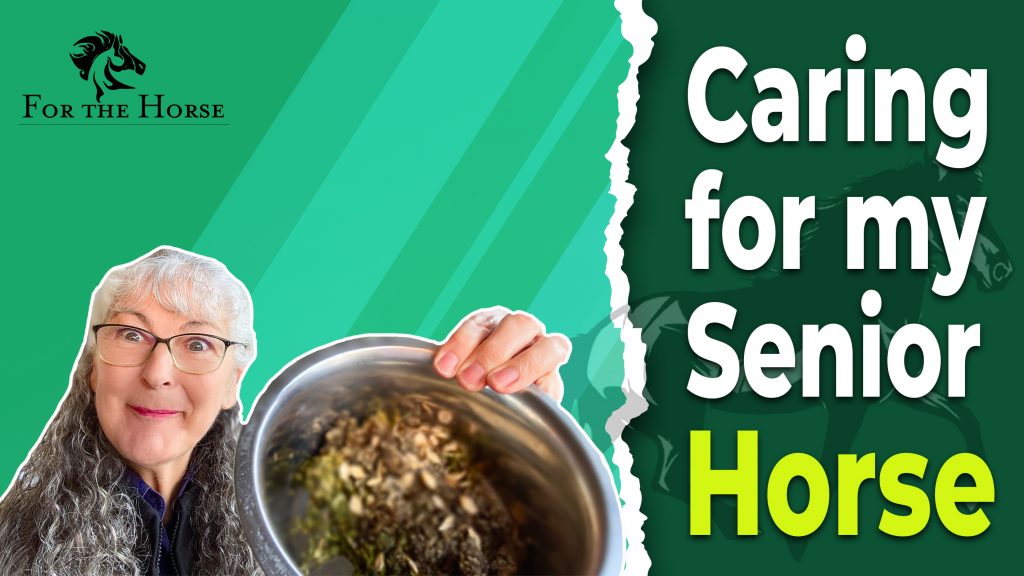Winter can be a really difficult time for elderly horses.
Knowing how to care for them is critical because that's when everything is the most extreme for them as they try to get through the cold and harsh winter winds.
Here's what we need to do:
Riding an elderly horse also requires special attention.
Our online rider program will show you how to ride with the best consideration for older horses. Discover more about our Program HERE.
TO BLANKET OR NOT TO BLANKET...
What we do with Holly, our quarter horse mare who's 31 years old, is we blanket her at night, so she gets her blanket off in the daytime and then at night when it's really cold, early morning the coldest time, she has her blanket on.
I don't typically blanket horses. But in this case, I like to, because it just helps her to stay a bit warmer and not use her precious energy to conserve heat.
She can then use the energy that she generates from the food that I give her, to keep weight on her and to survive and live in the winter.
DIGESTIBLE FOOD
Older horses need to get enough to eat and the food that we give them needs to be digestible.
Both of our older horses have access 24/7 to very high-quality hay, because she has no teeth, she can eat hay, it must be soft. Leafy hay is good or incredibly soft grass.
Now let's go through this mixture that works so well, all of the food right here in little dishes for you to see.
WATER
It's absolutely imperative that the older horse has 24/7 access to fresh, clean water.
Now, let's go through the formula that I use for my older horses...
#1. Hay cubes
This is a Timothy alfalfa hay cube, which I like the best. What you can do is soak them. I like to soak them with warm water, or even slightly hot water.
Not only do the horses like it when I take it out to them, because it's warm, and it feels good to them. It seems to penetrate the packed cubes better. The cubes are so hard, see, they pack them so hard to get a lot in. So the warm water, or slightly hot water works best.
#2. Beet pulp
Here is a bowl of beet pulp. I do not get the beet pulp with molasses added. This is just plain, pure beet pulp, and this is what I also soak with warm water. It takes at least an hour, but if you're using cold water, then I would leave it for four hours at least, so it's really well soaked.
#3. Rolled barley
This is rolled barley. It is flat so that it is easier for the older horses to eat - who don't have teeth. I combine all those three into a large bowl.
The proportions:
1 scoop of rolled barley
½ scoop beet pulp
2 scoops hay cubes
I also use pellets as well - extruded feed, but I do not really like feeding extruded feed, but in this case with an older horse, it's easier for them to digest. They do still need the roughage, so I like it when they have access to the hay 24/7.
So that's the formula for what I’m feeding these horses (from one of my friends who has tested and used this).
You need to be very careful with older horses about choking.
So, what I do for Holly, she gets a large portion of this because she needs this more than my other older horse. I make it almost like a soup, so I’ll add enough water so that when she goes to eat it at first, if she's hungry and she's waiting for this, I put enough water in there so that she can't eat it fast so she will actually slow herself down when she starts to eat, which is a good thing. You want them to eat slowly so it becomes an actual art, this feeding of our senior horses and throughout the winter.
As the days get colder as they get more wind and lower temperatures, you need to adjust.
So, this is a continual evaluation process as you're feeding, and along with that, I have to say that dental is the primary importance for an older horse. It's very important. Make sure that they have their incisors looked after. Make sure that they have full occlusions as much as possible.
Make sure that your older horses are happy and comfortable...
They need to move. They need a larger area to move in, a space to move in. This is going to keep their bodily functions moving. Keep them warm if they're standing still for long periods of time, which they can tend to do because there are older.
It's good to have them with other horses as well. So,
...they have friends and the other horses are moving them around
...they have interaction
...they have socialization
...they have physical movement
These are all important things that they're going to keep your older horse happy and keep them comfortable. It does take more time. It does take more energy. It does take more resources, more finances, more knowledge.
It takes more from us to look after an elderly horse.
So how are you going to look after yourself so that you can be there, get really great coaching for yourself and whether it's with me or with someone else?
It doesn't matter. But investing in yourself with great coaching is what's going to really feed you and nurture you so that you can give back to the elderly horses.
And when you get help and you get coaching like this, you grow yourself.
As I mentioned as we get to know our elderly horse more, we grow as people having support that will help you through that and having actual effective tools for you and your horse is what's going to help you solve your problems and make and help you to get huge progress.
This is what we do in my program... To find out more about how this is done and how our Harmony Program can help you CLICK HERE.
MORE RESOURCES TO HELP YOU BUILD YOUR DREAM HORSE

